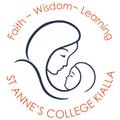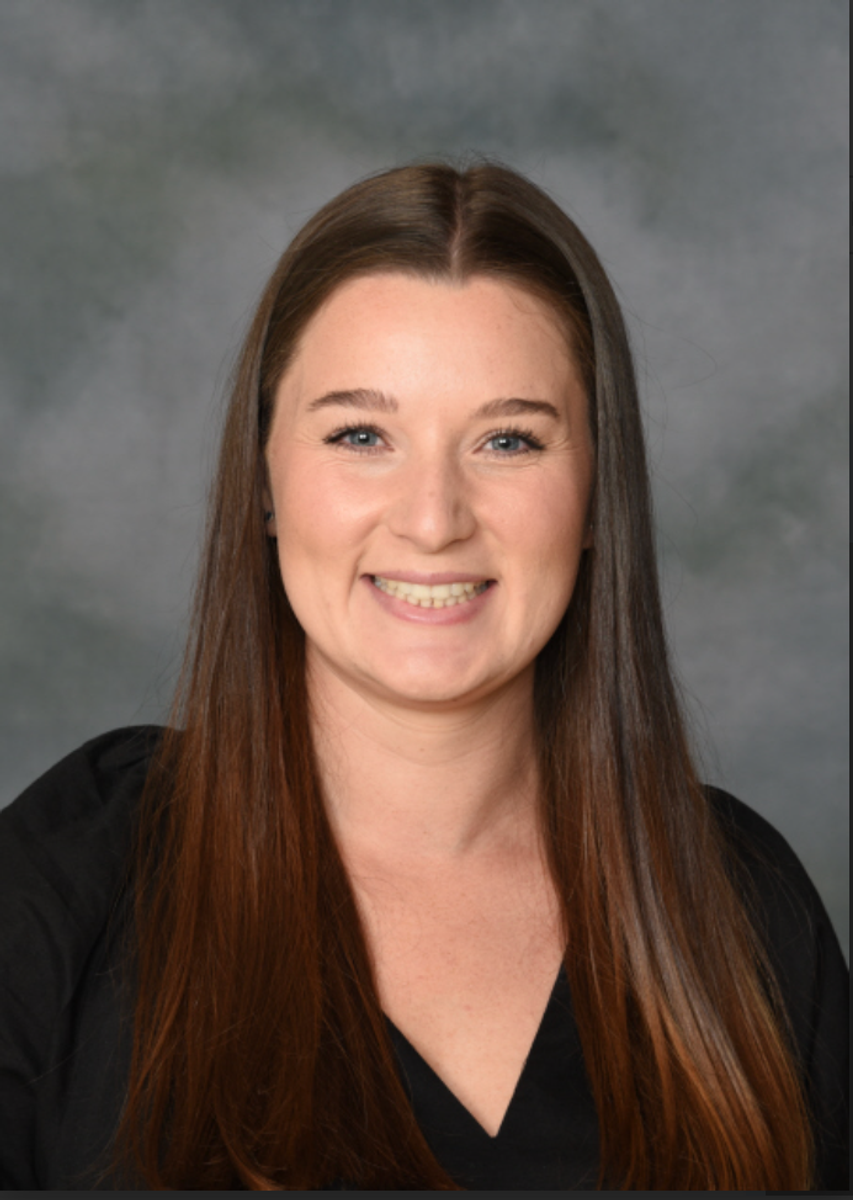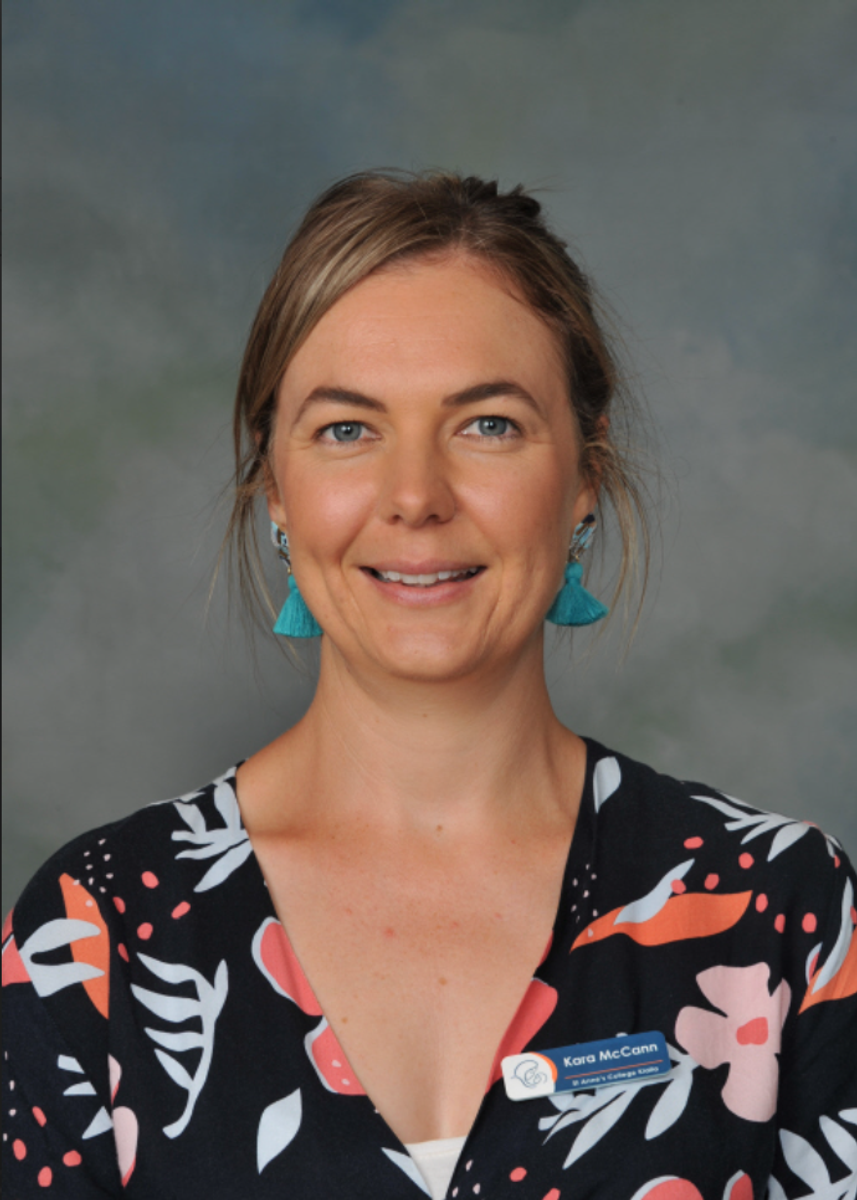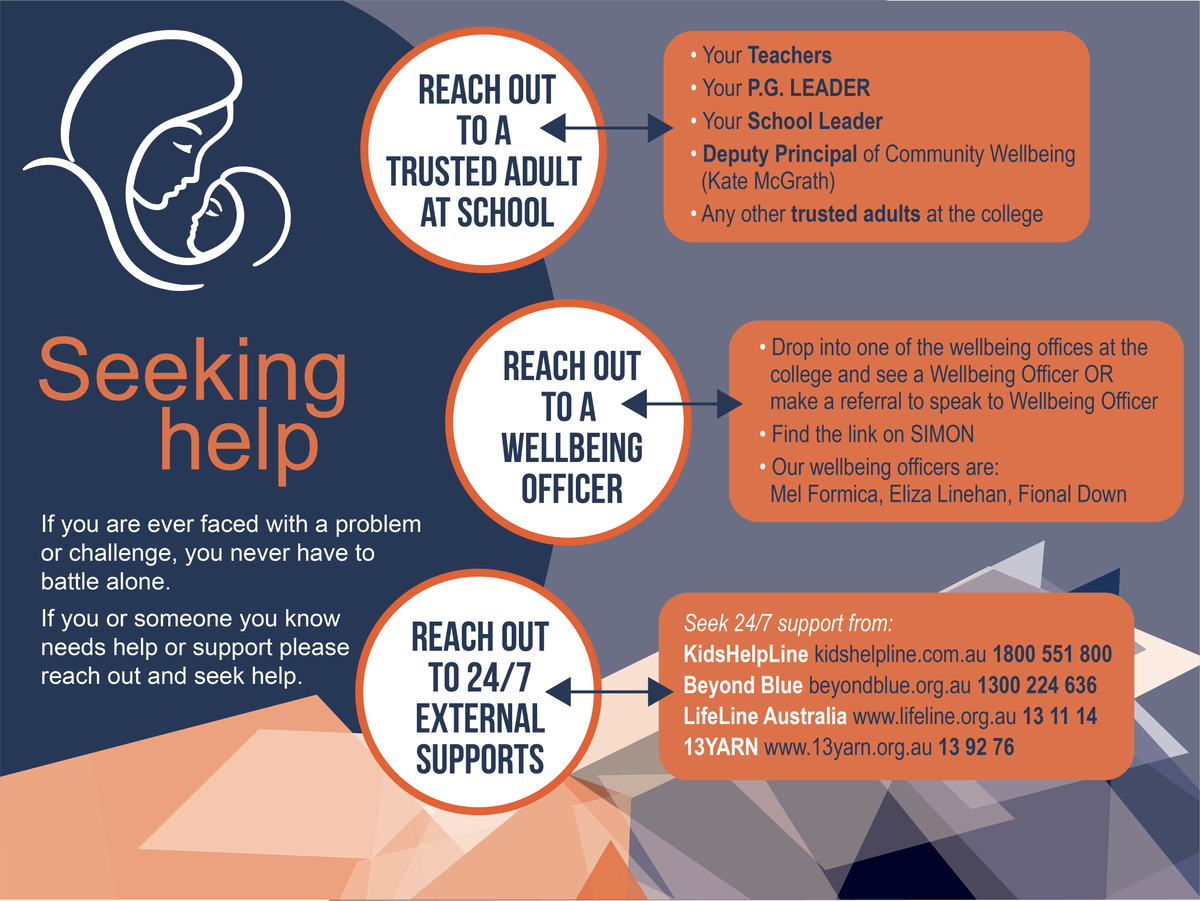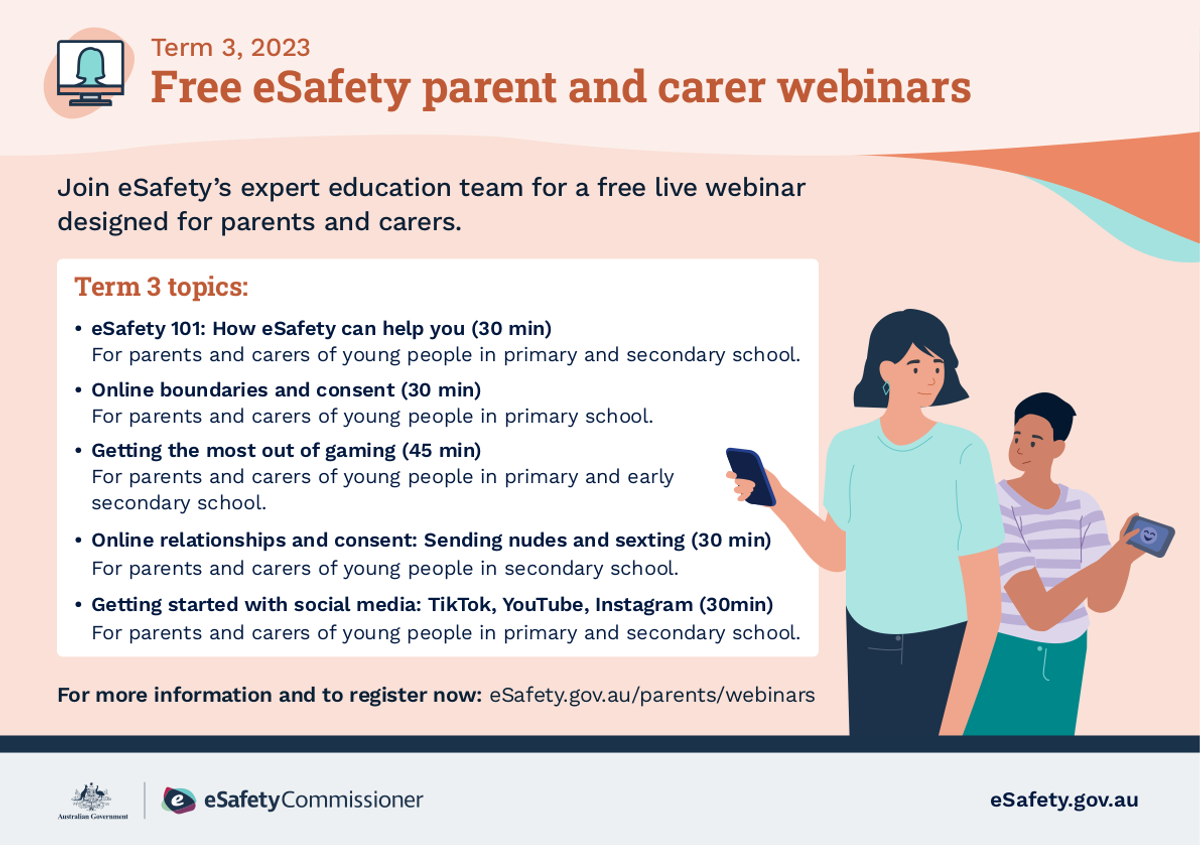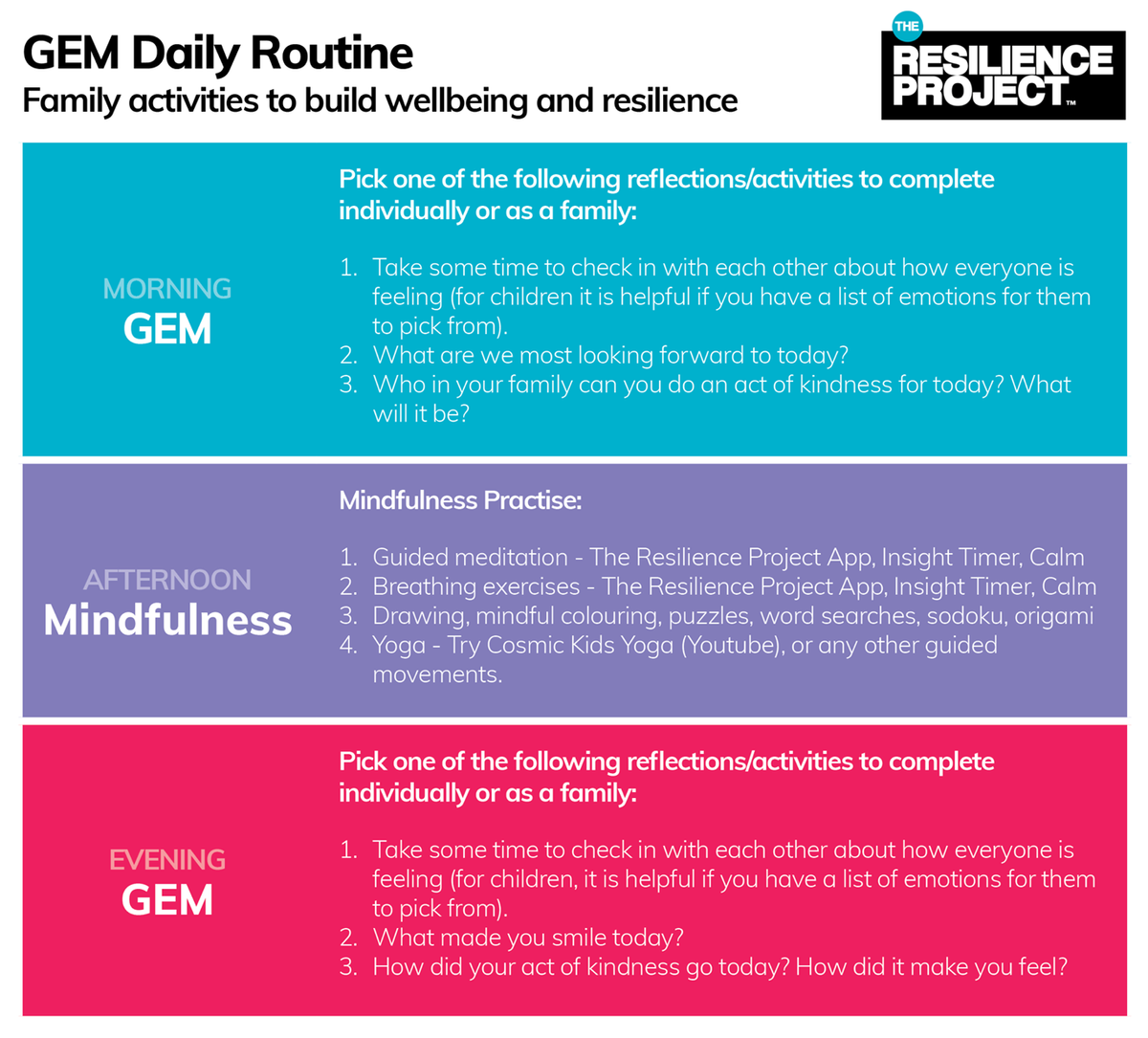Community Wellbeing

Emotional Literacy
Working on our emotional literacy gives us opportunities to develop our ability to understand and express different emotions. When we improve our emotional literacy, we can work towards recognising our own feelings and our ability to manage them. This allows us to cope with different life situations, such as managing conflict, making friends, coping in difficult situations and being resilient when dealing with change.
Whole Family Activity:
Feelings Charades
• Gather together as a family, this might be around the dinner table, lounge room, around the fire outside.
• Take turns to act out a feeling or emotion. Use your face and body language to act this out, For example: Make an angry face and stamp your feet or
• Other family members need to guess the feeling/emotion.
• After someone has guessed the feeling/emotion, have family members discuss a time they have felt this way before and why. If it was a negative emotion, how did they overcome it?
Family Habit Builder:
Around the dinner table, ask everyone to share a feeling they felt during that day. Discuss how they dealt with that feeling and then discuss and share strategies you could use when faced with particular feelings.
Cyber safety resources
If you require support to have discussions with your child about the use of their personal devices, the following resources may be useful:
https://www.cybersafetysolutions.com.au/
https://www.happyfamilies.com.au/
https://www.esafety.gov.au/key-issues/esafety-guide
https://staysafeonline.org/get-involved/at-home/cyberbullying/
https://www.familyzone.com/anz/families
https://www.stevebiddulph.com/Site_1/Home.html
https://www.beyondblue.org.au/who-does-it-affect/young-people/helpful-contacts-and-websites
Meet the College Wellbeing Team
Student wellbeing is an integral part of learning; a person’s emotional, social, mental and physical wellbeing is fundamental. When we are happy, healthy and well-adjusted we are able to learn more effectively and deal with life’s ups and downs. St Anne’s College believes that student wellbeing is a collaborative partnership between staff, parents/carers, our school and parish community.
At St Anne’s College we aim to provide a positive, safe and supportive school environment so that each student can reach their full potential. As a whole school, St Anne’s College facilitates and supports a range of proactive, preventative and early intervention programs across the school along with our SWPBS and school wide expectations. Our wellbeing approach is both proactive, through programs that are embedded in our curriculum, and when required reactive, as we support students in specific times of need.
Wellbeing support provided to students is confidential and optional. The Wellbeing team provides individual counselling and support to students for concerns such as mental health, stress management, friendship problems, grief and loss, social concerns, and general wellbeing. Wellbeing support also includes proactively building students’ resilience skills, communication skills and coping strategies.
Students can self-refer to the student wellbeing team via a student referral form on SIMON or request to speak to a Wellbeing Officer. Parents are encouraged to speak to their child’s Pastoral Group Leader if they have wellbeing concerns for their child or they can contact the school to speak to a Wellbeing Officer.
In some instances, a student may be referred to an external support service. We also respect the fact that some students and parents may prefer to seek professional support independent from the school setting. In such cases, the student wellbeing team values working collaboratively with external services. In all cases, we encourage parents to communicate with the school if there is a significant issue affecting their child’s health or wellbeing.
Wellbeing Team
Kate McGrath
Deputy Principal of Community Wellbeing
Kate has been at St Anne’s College since it opened in 2019. Kate studied a Bachelor of Education Health and Psychology. Kate has been working within the education sector for over a decade and has worked with students across all schools at St Anne’s College as well as other schools in both the Sandhurst and Melbourne Diocese. Kate stepped into the role of Deputy Principal of Community Wellbeing at the commencement of 2022 and works alongside the wellbeing team to support in the holistic implementation of wellbeing approaches and supports across the college. Kate is also a child safety officer at the college. Kate is passionate about wellbeing and the correlation between wellbeing and overall achievement and flourishing.
Mel Formica
Student Wellbeing Officer/School Counsellor
Available: Monday, Tuesday, Wednesday & Thursday.
Mel has been at St Anne’s College as a Wellbeing Officer/School Counsellor since 2020. Mel is a qualified counsellor and is a member of the Australian Counselling Association. Mel has a Bachelor of Human Services. Mel is also one of the Child Safety Officers at St Anne’s College. Mel has been working with young people for almost 15 years and has extensive experience supporting vulnerable/at risk young people and families in a wide range of settings and roles. Mel is passionate about supporting students to navigate their way through the various challenges they may face. Mel works across all year levels and is available Monday -Thursday.
Fee Down
Student Wellbeing Officer
Available: Tuesday, Wednesday & Friday
Fee joined the St Anne College community in 2022, taking on a part-time role in the Wellbeing team. Fee has a Bachelor of Social Work degree, along with over a decade of experience in working with vulnerable young people and families in the community. Fee’s passionate about supporting young people to overcome challenges and in helping them find ways so they can have a more positive experience in their environments. Fee is available Tuesday, Wednesday and Friday.
Eliza Linehan
Student Wellbeing Officer Available: Monday, Tuesday, Thursday & Friday
Eliza joined the St Anne’s College community at the beginning of the 2023 year and is working Monday, Tuesday, Thursday and Fridays. Eliza studied in Shepparton and has a Bachelor of Human Services and Master in Social Work. Eliza has been in the NT for the past 12 months working with vulnerable children and young people in school settings. Eliza is passionate about working in school environments with young people of all ages and assisting them to be the best they can be and do the best they can do.
Kara McCann
Mental Health in Primary Schools Leader
Kara joined the St Anne’s community in 2020. Kara is a passionate educator who has had extensive experience working with primary aged children for over a decade. This year Kara has taken on the role of Mental Health in Primary Schools leader. This is a new role at the college. Kara’s role entails working alongside SOW staff to support in the implementation of evidence based strategies and identification of mental health concerns and contributors in Primary Schools. Kara also supports parents and learning mentors in the primary years to develop connections with services and supports.
eSafety Parent Resources
St Anne’s College is committed to ensuring the safety and wellbeing of all children and young people in its community. We recognise the importance of teaching children and young people to develop cybersafe practices at a young age. As such, we recommend that parents too familiarise themselves with practices that promote a safe and secure online environment. This will ensure that education of cybersafe practices is consistent between school and home life.
eSafety’s expert education team offers free live webinars designed for parents and carers. These live webinars give parents and carers the knowledge, skills and tools to support their children to have safe online experiences.
Respect everyone and everything
Respect is an intrinsic part of building positive mental health. In this clip, Hugh Van Cuylenburg, founder of The Resilience Project, urges all who support the development of young people to not only speak about respect with young people but model respect.
The Raising Children Network explores the importance that parents play in influencing their child’s behaviour, attitudes and beliefs. This article provides practical tips for parents to positively influence teens and pre-teens and support them with their emotional literacy development and overcoming conflict and challenges, and navigating relationships.
The Resilience Project at Home
The Mental wellbeing of all is so important right now. Over the last few years, we have been confronted and overcome so many obstacles. We all know that modelling is the best way to authentically teach our young people. As parents and carers, being able to model positive steps you take to support your wellbeing is essential for our young people to witness. Incorporating the Resilience Project GEM principles (Gratitude, Empathy & Mindfulness) into your daily routine is a great way for you and your family to stay mentally healthy. Evidence tells us that consistent practise and implementation of the GEM principles will make you happier and more resilient.
For further information see TRP at Home.
Parent and Carer Hub
This hub gives parents and carers access to information about the GEM+EL principles and supporting activities for their wellbeing:
The Resilience Project - 3 Happy Tricks, for 5-12 Year olds
WED, 27 SEP 2023. Riverlinks Westside | Shepparton
Martin Heppell from TRP, who visited us earlier this year at school, is returning to Shepparton to run a community event run by the Greater Shepparton Council. Although this event is not run by the college we highly encourage our community to attend the event as it aligns with the work we are doing at school! Please note that this event is not run or organised at/ by the college. This event is an external opportunity that is invitational. SOW families wishing to engage in this will be required to seek their own means of getting to and from the event. Please note that this event will not be supervised by College staff. Supervision and means of transportation of students wishing to attend will be the responsibility of parents/ careers.
EVENT DETAILS
THE RESILIENCE PROJECT is tackling children’s mental health with a high-energy kids show tour across Victoria this September. Through music, storytelling and plenty of laughs, The Resilience Project’s most engaging and entertaining presenter Martin Heppell will teach primary aged children (5–12 year-olds) and their parents ‘3 Happy Tricks’. And it couldn’t come at a more crucial time. Register for free with My Live Nation to get first access to tickets.
Support children to stay safe online
From the time our children are born, we all put measures in place to keep our kids safe. We constantly discuss the importance of wearing bike helmets and seatbelts, crossing at the lights, not talking to strangers and staying away from hot surfaces all in the name of safety.
In today's digitally connected world, parents have to not only help navigate the safety aspects of children and young people in our physical world but also in our online world. The online world brings with it many benefits but also challenges and risks. Technology is a part of our children’s world from a young age. Children have access to online programs in their prams. The safety commissioner promotes that it is never too early to be talking to our kids about online safety. The Daniel Morecombe Foundation also has many practical tips on the measures that can be taken to support your child in being safe online.
Every Day Counts!
Did you know, students who attend school regularly are more likely to have higher paying jobs when they leave school and overall better health?
A day here or there doesn’t seem that much, but each day adds up. If a child misses two days a month, that can equal up to four weeks across the year. This equates to one year of lost learning across a child’s school journey from Foundation to Year 12! Every day counts.
Attendance is an important contributor to a student’s academic achievement and social engagement. When children miss days of school it can make it harder for them to catch up. They might fall behind and it impacts the ability to make important social connections and build relationships with their peers. This can attribute to increased feelings of anxiety and attribute to mental health problems later in life.
Parents play an important role in helping children develop healthy attendance patterns.
Parents can implement consistent morning routines at home and help their child to develop healthy sleeping patterns by minimising and setting boundaries around technology of a night time and setting up expected bed times. Where possible, making appointments outside of school hours and taking holidays in the school holiday periods can also decrease your child’s rate of absenteeism.
There are few acceptable reasons why a child should be absent from school, however if your child is unwell, there is a bereavement or a religious reason, please contact the college to notify of your child’s absence by calling the administration office on (03) 4812 2993 or by logging a parent notified absence on PAM.
If your child is showing signs of school refusal, please make contact with your child’s Pastoral Group Leader to make a time to meet to discuss how we can work together to support your child to have success.
Set your child up for a bright future - every minute of every day counts.
- Kate McGrath, Deputy Principal Community Wellbeing
